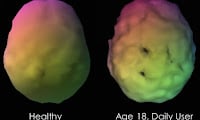Poor sleep quality may impact Alzheimer’s disease onset and progression. This is according to an eye-opening study led by researchers at the Johns Hopkins Bloomberg School of Public Health who examined the association between sleep variables and a biomarker for Alzheimer’s disease in older adults. The researchers found that reports of shorter sleep duration and poorer sleep quality were associated with a greater β-Amyloid burden, a hallmark of the disease. The results are featured online in the journal, “JAMA Neurology”. (Continued below video seminar…)
Sleep, Aging, and Brain Health: Implications for Prevention
Adam Spira, PhD, Johns Hopkins Bloomberg School of Public Health
“Our study found that among older adults, reports of shorter sleep duration and poorer sleep quality were associated with higher levels of β-Amyloid measured by PET scans of the brain,” said Adam Spira, PhD, lead author of the study and an assistant professor with the Bloomberg School’s Department of Mental Health. “These results could have significant public health implications as Alzheimer’s disease is the most common cause of dementia, and approximately half of older adults have insomnia symptoms.”
Alzheimer’s disease is an irreversible, progressive brain disease that slowly destroys memory and thinking skills. According to the National Institutes of Health, as many as 5.1 million Americans may have the disease, with first symptoms appearing after age 60. Previous studies have linked disturbed sleep to cognitive impairment in older people.
In a cross-sectional study of adults from the neuro-imagining sub-study of the Baltimore Longitudinal Study of Aging with an average age of 76, the researchers examined the association between self-reported sleep variables and β-Amyloid deposition. Study participants reported sleep that ranged from more than seven hours to no more than five hours. β-Amyloid deposition was measured by the Pittsburgh compound B tracer and PET (positron emission tomography) scans of the brain. Reports of shorter sleep duration and lower sleep quality were both associated with greater Αβ buildup.
Spira said that the findings cannot demonstrate a causal link between poor sleep and Alzheimer’s disease, and that longitudinal studies with objective sleep measures are needed to further examine whether poor sleep contributes to or accelerates Alzheimer’s disease.
Dr. Spira concluded,
“These findings are important in part because sleep disturbances can be treated in older people. To the degree that poor sleep promotes the development of Alzheimer’s disease, treatments for poor sleep or efforts to maintain healthy sleep patterns may help prevent or slow the progression of Alzheimer disease.”
More Information::
“Self-reported Sleep and β-Amyloid Deposition in Community-Dwelling Older Adults,” was written by Adam P. Spira, Alyssa A. Gamaldo, Yang An, Mark N. Wu, Eleanor M. Simonsick, Murat Bilgel, Yun Zhou, Dean F. Wong, Luigi Ferrucci and Susan M. Resnick.
The research was supported in part by the National Institutes of Health and the Johns Hopkins School of Medicine Brain Science Institute. Dr. Spira is supported by Mentored Research Scientist Development Award (K01AG033195) from the National Institute on Aging.
Sources:
Journal Reference:
- Adam P. Spira. Self-reported Sleep and β-Amyloid Deposition in Community-Dwelling Older Adults. JAMA Neurology, 2013; DOI: 10.1001/jamaneurol.2013.4258












My grandfather as a doctor used to tell me how important sleep was, now as an older adult I see the value in getting good sleep
thanx